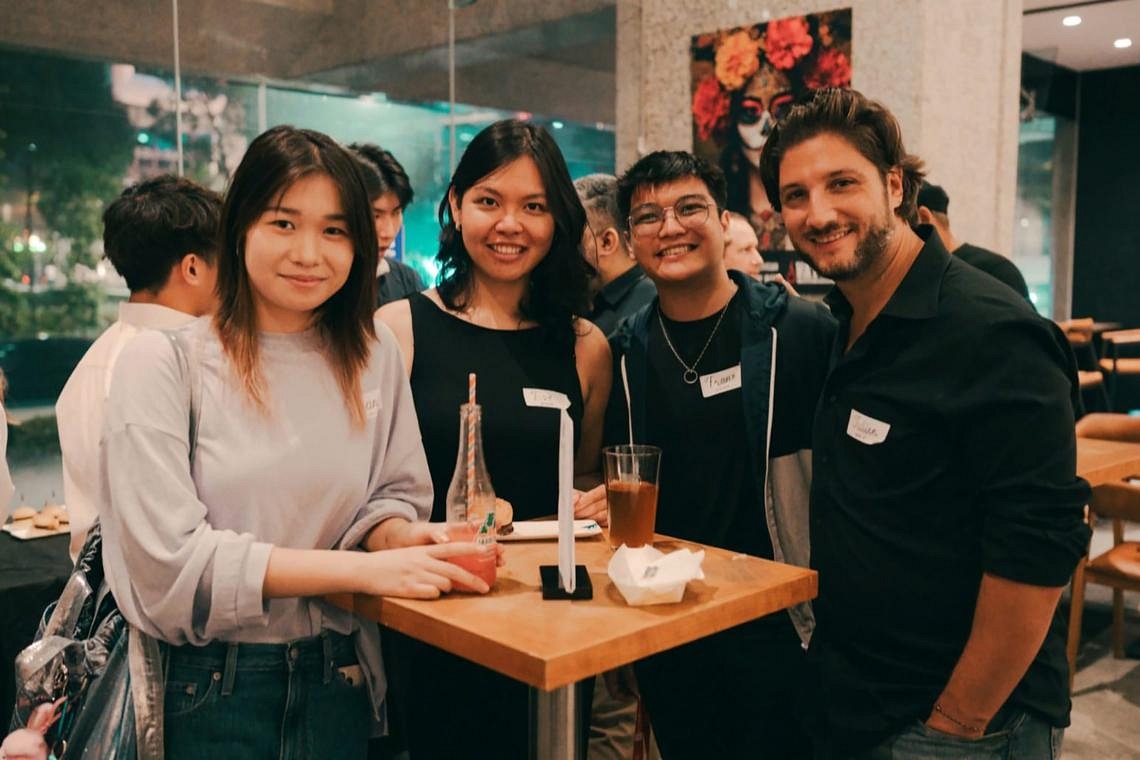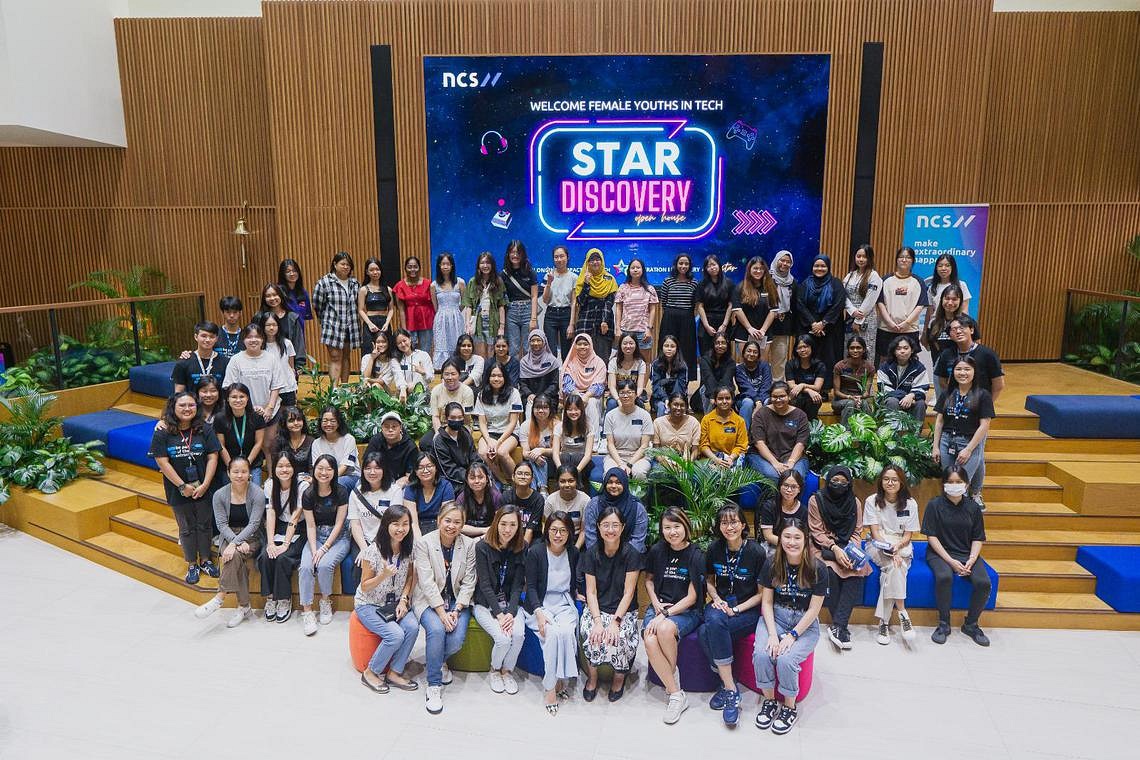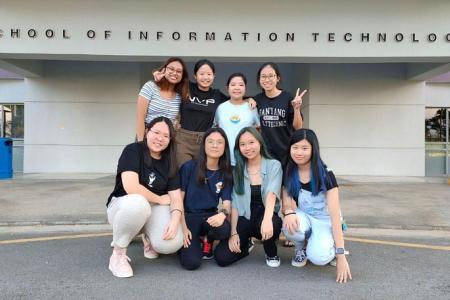S’pore women have to fight gender biases to join AI boom
Nanyang Technological University computing student and IT security consultant Seraphina Chua, 21, has often experienced a subtle prejudice that assumes technical roles are more suited to men.
She said: “I’ve experienced times when I felt overlooked or underestimated, and much of this might stem from gender biases – whether intentional or not.
“In such cases, I often felt that I had to prove myself more than my male counterparts, even when I was equally qualified.”
This issue is one invisible barrier standing in the way of more women such as Ms Chua exploring the rapidly expanding field of artificial intelligence (AI).
Getting more women to break down these barriers has become a priority for educational institutions, companies and the Government, as well as women who are already working in the field.
While many of these barriers are already prevalent in the wider areas of science, technology, engineering and mathematics (Stem), in the emerging field of AI, the stakes go beyond equal representation and good jobs.
The gender imbalance in the field does not just mean capable women may be missing out on potentially lucrative employment, but it also has implications on the nascent technology’s potential biases and applications, said practitioners, students and experts.
Various studies have shown that AI models can absorb and amplify the biases of their human creators.
Fewer women at the top, fewer in talent pipeline
At Singapore’s institutes of higher education, there is a lower rate of women signing up to study AI and machine learning (ML) – a subfield of AI broadly defined as the capability of a machine to imitate intelligent human behaviour – compared with their male counterparts.
Female students comprised about a quarter of enrolment in AI and ML programmes at Singapore’s polytechnics and universities over the past five years, Education Minister Chan Chun Sing told Parliament in November 2024.
The persistent difficulty in attracting women to these courses comes amid a government drive to triple the current number of AI practitioners here to 15,000 as Singapore seeks to place itself at the forefront of the emerging technology.
The Republic plans to do so by training locals and hiring from overseas as part of an updated national AI strategy, announced by Prime Minister Lawrence Wong at the end of 2023.
Several factors contribute to the gender disparity in Stem programmes, including those that focus on AI and ML, said Singapore Institute of Technology deputy president and provost John Thong.
“One significant influence is early socialisation, where girls are often steered towards people-oriented careers, while boys are encouraged to pursue Stem fields,” said Professor Thong.
“Additionally, the scarcity of female role models in AI and tech leadership can discourage young women from envisioning themselves in these roles.”
SIT’s own numbers echo national averages – approximately 25 per cent of its students in Stem and AI programmes are women.
While the overall numbers are low, universities here said they have recently seen an uptick in interest among the female cohort.
A spokesperson from Singapore Management University said its computing-related courses have a female enrolment of about 35 per cent, compared with about 60 per cent for law and 75 per cent for social sciences.
At the National University of Singapore, overall female enrolment in such courses also stands at 25 per cent, but the total number of women pursuing undergraduate and master’s programmes in AI and ML has increased by about 40 per cent in the last academic year, compared with three years ago.
NTU has also seen more female students taking up courses in AI and ML.
Its dean of the College of Computing & Data Science and vice-president of AI and digital economy, Professor Luke Ong, gave the example of the Bachelor of Computing in Data Science and Artificial Intelligence programme, where four in 10 of the students enrolled in the academic year starting in August 2024 were women.
Widespread interest in AI took off in 2022 with the launch of ChatGPT, a chatbot which uses generative artificial intelligence to answer questions in simple language, using algorithms to process large amounts of information at speed.
Developed by OpenAI, it demonstrated so much potential to quickly automate a large volume of tasks traditionally done by humans that it prompted a US$13 billion (S$17.8 billion) investment from Microsoft and triggered an arms race between the big tech players to get their own AI products off the ground.
Professional services firm Accenture’s managing director for Singapore Eleana Liew said: “We see AI as the next ‘digital’ – a transformative force that can boost productivity across over 900 job types by automating mundane tasks and enabling people to focus on higher-value work.”
As AI reshapes industries and daily life, women must play a central role in this transformation, she said.
Breaking down barriers
Ms Liew noted that the World Economic Forum’s Global Gender Gap Report released in 2024 found that women make up just 28.2 per cent of the Stem workforce, compared with 47.3 per cent in non-Stem sectors.
This under-representation of women in Stem is a challenge for Singapore, as it limits the talent pool available for the rapidly growing sector, impacting all industries, said SIT’s Prof Thong.
He added: “Moreover, this imbalance risks perpetuating gender biases in the development of AI solutions, and creates a shortage of female role models in the field, which can deter future generations of women from pursuing careers in technology.”
Agreeing, NUS PhD student and AI start-up founder Evelyn Goh said a lack of female representation may have more costs down the line as the technology develops.

Ms Goh, whose doctorate is in the field of AI, founded Megrez, a company which uses the technology to develop medical software.
Raising the example of how some medical science was initially based only on research done on men, Ms Goh said that AI and its applications risk being similarly biased if more women are not working in the field.
“Future products or applications from AI or machine learning may not be able to cater to women if the technology is not designed for the entire population from the beginning,” she said.
For the women in the field, barriers also exist – they may find it harder to reach senior positions, a problem seen across the tech sector and not unique to Singapore, noted Accenture’s Ms Liew.
“There are several reasons for this. One of the biggest is societal norms that continue to expect women to shoulder the dominant weight of caregiving responsibilities at home,” she said.
Some progress has been made to chip away at some of these barriers, on both a policy and an organisational level.
Research shows that the share of female talent in AI engineering has more than doubled since 2016, Ms Liew noted.
Minister for Digital Development and Information Josephine Teo said: “We’ve seen encouraging progress for girls and women in tech. For example, the enrolment gap has narrowed for courses that are Stem-focused.”
She added that Singapore will have to keep up efforts in engaging all parties to expand opportunities for girls and women in tech.
According to Mrs Teo, the SG Women In Tech (SGWiT) initiative has reached more than 115,000 girls in primary and secondary schools, as well as tertiary institutions, connecting them with female role models in the field.
It is an initiative by the Infocomm Media Development Authority (IMDA) to support women taking up careers in the field.
The polytechnics and universities are also putting in place measures to ease entry for women into Stem-related courses.
For example, NTU is running a programme known as the Promotion of Women in Engineering, Research and Science (Powers), which aims to equip female students with skill sets to embark on such careers.
IMDA is also working with polytechnics through SGWiT to reach female students and grow their interest in tech careers at talks and workshops, as well as with mentorship opportunities.
Some women, like NTU’s Ms Chua, are taking matters into their own hands.
Despite being repeatedly underestimated, she has not been deterred.
While studying cyber security and digital forensics at Nanyang Polytechnic, Ms Chua was head of talent attraction in Girls in Tech – an inter-polytechnic committee driven by IMDA and Singapore’s five polytechnics.
She said: “We organise events, workshops and talks designed to raise awareness (among girls) about the diverse opportunities available in the tech industry.
“In a traditionally male-dominated industry, finding a sense of belonging can sometimes be difficult (for women), and having a community of like-minded individuals fosters camaraderie and encourages women to support each other.”
Ms Chua also has a full-time job as an IT security consultant at multinational IT firm NCS. She had taken up an internship at the company which was offered by a recruiter at a Girls in Tech event.
She joined NCS in 2024 and the company supported her undergraduate studies through its work-study programme.

NUS’ Ms Goh said that in addition to organisational support, creating an inclusive environment also requires small individual actions.
At her lab in NUS, about half the researchers are women – a result that she attributes to her supervisor, Associate Professor Feng Mengling’s focus on respect and merit.
She said: “He has never overtly made statements about including women or things like that; it’s more about the way he makes everyone feel welcome regardless of their background.
“At the end of the day, it’s not about forcing women into the field but making sure that they feel it is a choice that they do not enter rather than that they cannot.”
Get The New Paper on your phone with the free TNP app. Download from the Apple App Store or Google Play Store now


